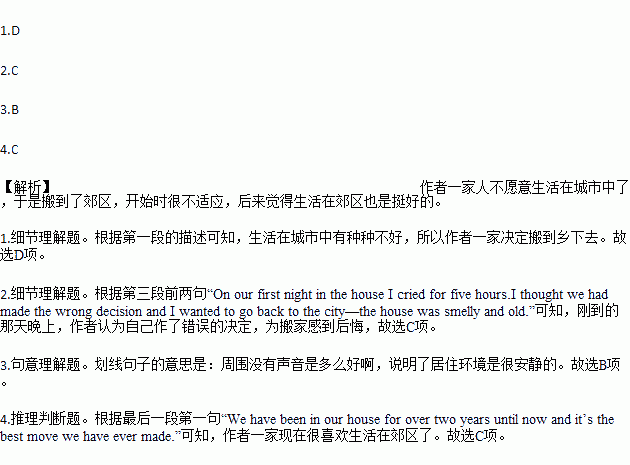题目内容
My husband and I used to live in the city.But we often faced a lot of problems there.There was a lot of late?night noise.It was difficult to find parking.And the rent of the apartment was high.Finally,my husband and I decided to move to the suburb outside Boston.
We started looking for our new home.It turned out that many other people were also moving to the suburbs and it wasn’t easy to find a nice house there.Finally we went to see a small and dark house.It needed a lot of work.But it was well built and it was on a street where we could walk to Starbucks,restaurants and bus stops.Well,before I knew it,we had made an offer and the house became ours.
On our first night in the house I cried for five hours.I thought we had made the wrong decision and I wanted to go back to the city—the house was smelly and old.And many families and old people lived around it.But after thinking of the problems we had when we were living in the city,I calmed down.Besides,our new home wasn’t that bad,after all.I had a driveway of my own.There were three big bedrooms and a backyard for my dog.Oh,how lovely the sound of nothing was.I changed the house inch by inch and it became a very comfortable home.
We have been in our house for over two years until now and it’s the best move we have ever made.While I’m glad I can drive into the city in fifteen minutes and enjoy all it has offered,I’m always happy to return home.
1.Why did the writer and her husband move to the suburb?
A. They found jobs there.
B. They could only afford a small house.
C. They dreamed of living in the country.
D. They no longer liked living in the city.
2.On the first night in the house,the writer .
A. was too excited
B. felt scared living there
C. regretted moving there at first
D. was moved to tears by its quietness
3.What does the underlined sentence in Paragraph 3 show about the house?
A. It was lovely.
B. It was really quiet.
C. It had nothing in it.
D. It has beautiful sound.
4.We can learn from the passage that the writer .
A. hates driving to the city
B. is afraid of returning home
C. loves living in the suburbs now
D. cannot wait to go back to the city

